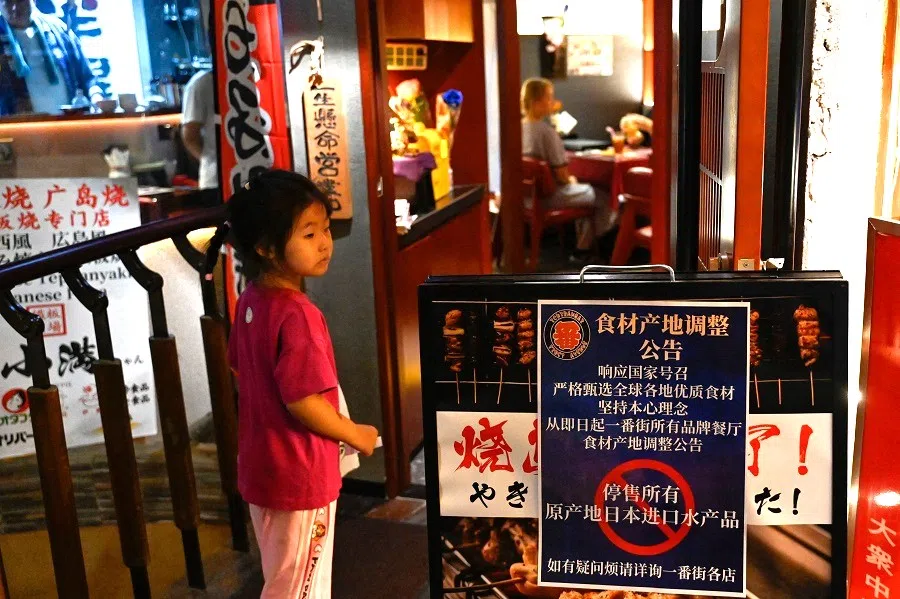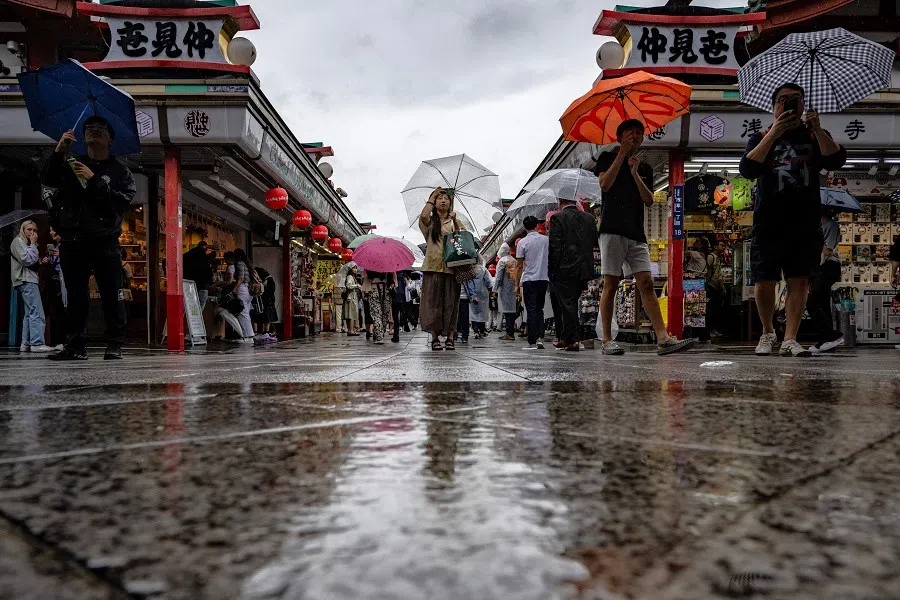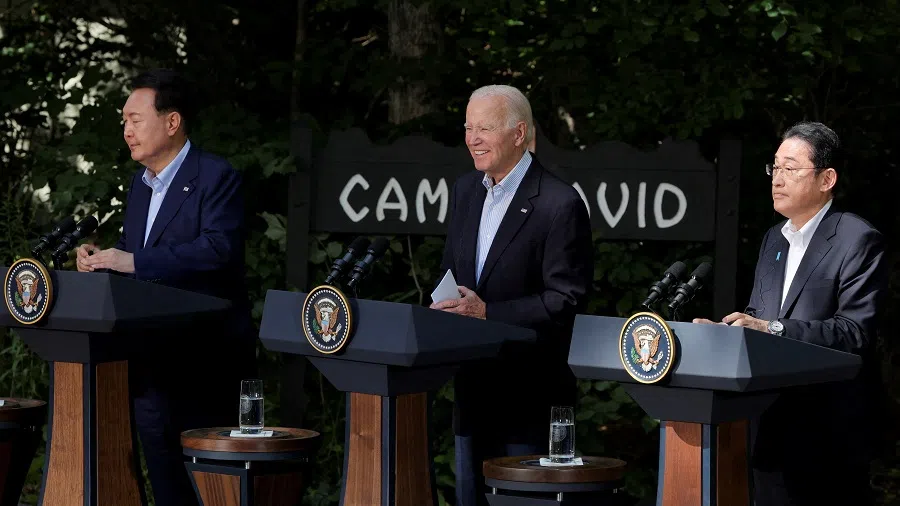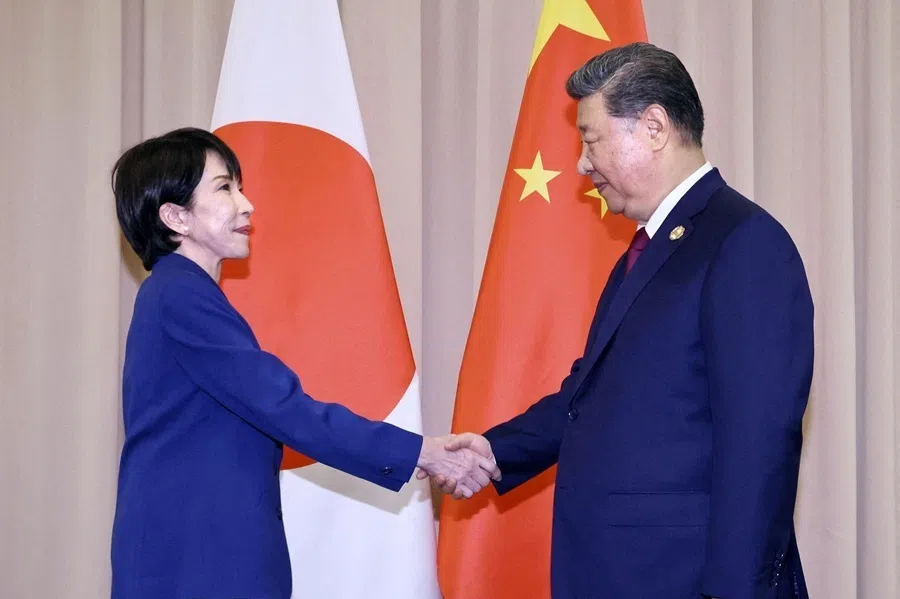Frostier Japan-China ties with Fukushima treated wastewater discharge
Japan's discharge of treated nuclear wastewater into the sea has dealt another blow to the political, economic and trade relations between China and Japan. Zaobao correspondent Yu Zeyuan elaborates.

Japan's release of Fukushima's nuclear wastewater into the sea has triggered another war of words between China and Japan, sharply raising anti-Japan sentiment in China. With the postponement of Komeito party head Natsuo Yamaguchi's planned visit to China on 28-30 August, China-Japan relations are worsening and may be headed for a downward spiral.
When the Japanese government started releasing nuclear wastewater into the sea on 24 August, the Chinese foreign ministry reacted immediately, stating: "China firmly opposes and strongly condemns it. We have made serious démarches to Japan and asked it to stop this wrongdoing." China's General Administration of Customs also announced that it would suspend all imports of aquatic products from Japan.
Japanese government data on 27 August showed radioactivity levels in Fukushima waters to be within safe limits. Japanese officials have since protested China's ban on its aquatic products and requested China to lift the ban.
Strong reactions from China
On 26 August, the embassy of Japan in China said on social media that China's aquatic products ban was not based on scientific evidence; this was not acceptable to Japan and it hoped that Chinese consumers would react to the situation calmly based on science. At the same time, unrelated individuals and organisations in Japan have been receiving nuisance calls from China. Japan has categorised this as "criminal activity" and urged the Chinese government to take appropriate action.

As for the postponement of the visit to China by Natsuo Yamaguchi, seen as a representative of Japan's pro-China faction, this was done at China's request and with the message that the timing of the visit was "not appropriate".
Yamaguchi had recently told Japanese Prime Minister Fumio Kishida that he would communicate Japan's release of nuclear wastewater to China during his visit and develop China-Japan relations in a holistic way. But China's sudden postponement of his visit shows that China does not wish to engage with Japanese politicians amid a surge in domestic public opinion, even if the visitor is Yamaguchi, who has friendly relations with China.
With China's ban on Japanese aquatic products, these restaurants could be in a pickle.
Rush to stock up on salt and dine at Japanese restaurants
Over the past few days, Japan's nuclear wastewater release has triggered strong reactions in China, with people rushing out to buy salt, just as they did during the SARS epidemic two decades ago. However, after officials assured them that sea salt made up only 10% of the salt people consumed and that there was enough to go around, the "salt frenzy" promptly ended.
Changjiang Daily (《长江日报》) reported that after Japan activated the nuclear wastewater release, several Japanese restaurants in Shanghai saw snaking queues with an average waiting time of an hour or so as customers were hoping to have their fill "while it was still safe".

According to statistics, there are about 70,000 Japanese restaurants in mainland China, second only to Western fast food chains. These eateries are mainly concentrated in first-tier and coastal cities. With China's ban on Japanese aquatic products, these restaurants could be in a pickle.
Chinese public opinion has also been abuzz. Most views concur with the official position that Japan's discharge of Fukushima's nuclear wastewater into the sea would pollute the marine environment. They also support the ban on Japanese aquatic products imports in the name of food safety.
Since most countries including the US do not oppose Japan's release of Fukushima nuclear wastewater into the sea, they think that the Chinese government's opposition is making a mountain out of a molehill.
Some netizens see the Japanese point of view
But some Chinese netizens think that the public should not assume that there would be damage to the marine environment but to trust the monitoring data - if the data does not exceed the limit, they should simply consume seafood with peace of mind; overreaction will only hurt China's massive seafood industrial chain.
Other Chinese netizens agree with the Japanese government's stance and think that the release of treated nuclear wastewater into the sea is safe and backed by monitoring data from Japan and the International Atomic Energy Agency (IAEA). Since most countries including the US do not oppose Japan's release of Fukushima nuclear wastewater into the sea, they think that the Chinese government's opposition is making a mountain out of a molehill. They are also convinced that the public's opposition arose out of ignorance, incorrect information or even as a result of blind anti-Japan populist sentiments.

"Xixifu pinglun" (西西弗评论), a verified internet celebrity, recently released an article criticising Japan's nuclear wastewater release and condemning the people who defended Japan's actions. The article said the discharge of nuclear wastewater into the sea was controversial, and there was no consensus among various sectors of the community, including within Japan itself. In a survey conducted by The Asahi Shimbun in August, only 53% of respondents said they supported the government's water discharge plan, while 41% said no.
The article pointed out that the IAEA and other scientists' scientific assessments of Japan's water discharge plan had largely relied on the information and data provided by the Japanese government and Tokyo Electric Power Company (TEPCO), and lacked independent third-party sampling and monitoring. At the same time, the credibility of TEPCO has long been called into question. Furthermore, while the option of injecting the nuclear wastewater into deep geosphere layers and burying it underground was available to the Japanese government, it refused to do so, even though this was clearly safer and more acceptable to neighbouring countries.
... China's all-out ban on Japanese aquatic products, suspension of exchanges with Japanese politicians and other countermeasures will also stir up anti-China sentiments among the Japanese public...
"Tuzhuxi", another verified internet personality, published an article saying that only two types of Chinese would support Japan's sea discharge plan: One, "spiritually Japanese" (精神日本人) who love Japanese aesthetics and culture. Such individuals rarely understand politics and are mainly attracted to Japan for its literature and arts.

Two, those who are critical of the Chinese system and are driven by ideology, values and their own economic interests. These people believe the Chinese system to be backward while Japan's is advanced and civilised. Their interest in Japan is limited to the consumption of Japanese material culture (travelling and investing in Japan, or introducing products and services with Japanese aesthetics), as well as criticism of the Chinese government and system.
China-Japan relations at stake
Japan's discharge of nuclear wastewater into the sea has clearly sparked great concern and controversy in China, and further deepened anti-Japan sentiment among the Chinese public. At the same time, China's all-out ban on Japanese aquatic products, suspension of exchanges with Japanese politicians and other countermeasures will also stir up anti-China sentiments among the Japanese public and make communication and dialogue between China and Japan even more difficult.

Since this year, Japan has matched US export controls and placed restrictions on the export of 23 types of semiconductor manufacturing equipment to China, while the US, Japan, and South Korea have formed a trilateral military alliance at Camp David. The Chinese Navy and Air Force have also continued to operate near Japan, triggering tensions in China-Japan military relations. China has also been highly wary of Japan's potential role in the especially sensitive Taiwan issue.
Now, Japan's discharge of nuclear wastewater into the sea has dealt another blow to the political, economic and trade relations between China and Japan. With the foundation of China-Japan cooperation constantly undermined and weakened, confrontation may become the main theme of China-Japan relations in the period ahead.
This article was first published in Lianhe Zaobao as "中日关系雪上加霜".
Related: [Big Read] Doubts over Fukushima wastewater release hard to overcome | Japanese academic: A hard look at the true impact of Fukushima Daiichi water release | Fukushima wastewater: Why China is protesting while the US gives the nod | Japanese academic: China imposing its 'Asian values' on its neighbours | Japan and China: A 'cooperative' relationship fraught with uncertainties | Can Japan and China find common interests and live in peace? | How China and Japan see each other





